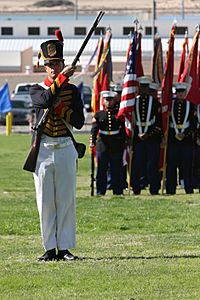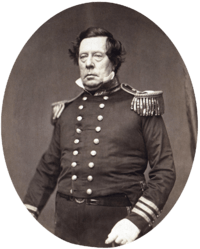Samuel Bacon facts for kids
Quick facts for kids
Samuel Bacon
|
|
|---|---|
| Born | July 22, 1781 |
| Died | May 2, 1820 (aged 38) Cape Shilling, Sierra Leone Colony
|
| Nationality | American |
| Occupation | Lawyer, US Marine Corps officer and religious minister |
| Known for | Participation in the first American Colonization Society expedition |
Samuel Bacon (born July 22, 1781 – died May 2, 1820) was an American who had many different jobs. He was a lawyer, a journalist, an officer in the United States Marine Corps, and a religious minister. He worked for the US government on the first trip by the American Colonization Society to Africa. This trip faced a terrible illness called African fever. Bacon tried to get help from a British settlement nearby. He became very tired and sadly died. Before he passed away, he made sure the expedition's supplies were given to Daniel Coker.
Contents
Samuel Bacon's Early Life
Samuel Bacon was born on July 22, 1781, in Sturbridge, Massachusetts. He was the youngest of nine children. He went to school in Leicester, Massachusetts. Samuel was supposed to go to Harvard University in 1804. However, he got sick and could not start until September 1806.
After he graduated and got better, he became an editor for a newspaper called the National Aegis. This newspaper was in Worcester, Pennsylvania. Soon after, Bacon left this job. He moved to Philadelphia in December 1809. He then worked as a lawyer in several towns in Pennsylvania, including York, Carlisle, and Shippensburg.
Later, Bacon moved to Lancaster, Pennsylvania. There, he started a successful school. He also edited a weekly newspaper called Hive from May to December 1810. Bacon eventually sold his school to York College of Pennsylvania.
Joining the Marine Corps
Samuel Bacon became interested in the United States Marine Corps because of a friend. This friend was an officer in the Marines. In early 1812, Bacon asked President James Madison for a job as an officer. He was accepted on April 14, 1812. This meant he gave up the chance to lead York College. He was given six months off to get his things in order before joining.
The War of 1812 caused the Marine Corps to grow quickly. Bacon was promoted fast. He became a first lieutenant on July 8, even while still on leave. The Marine Corps leader, Franklin Wharton, asked Bacon to start his duty early. So, Bacon reported to headquarters in Washington, D.C., in October 1812.
On March 1, 1813, Bacon was sent to New York. He was supposed to lead the Marines on the ship USS Argus. But this order was changed just five days later. The Argus' commander only wanted a sergeant to lead his Marines. Bacon then served on several military court panels. He also worked as a recruiter in New York and Peekskill.
Wharton made Bacon the quartermaster of the Marine Corps on September 1, 1813. A quartermaster handles supplies and equipment. Bacon held this job until April 30, 1815, through the rest of the war. Around this time, Bacon was hurt in a duel with another Marine officer. He was badly wounded in his leg. This meant he could not do his job for several weeks.
He married Anna Mary Barnitz on May 31, 1814, in York. On June 18, he was promoted to captain. Bacon likely helped with supplies for Commodore Joshua Barney's naval forces. These forces were defending Washington, D.C.
Bacon became a lawyer in Washington, D.C., on January 9, 1815. His son was born in March that year. Bacon was not happy with his job because it was not in combat. So, he resigned as quartermaster on April 30. Wharton then assigned him to recruiting duty in York. There, Bacon started practicing law in his free time.
Law and Religious Life
Samuel Bacon's wife died on August 28, 1815. In November, he left the Marine Corps completely. He wanted to focus on his law practice. Soon, he was appointed as a deputy attorney for the district court in York and Adams counties. He was also chosen as a major in the state militia.
Bacon became very religious. He joined the German Lutheran Church in May 1817. But soon after, he joined the Episcopal Church. He also started at least 26 Sunday schools in York County.
On September 9, 1818, he wrote to President James Monroe. He suggested Samuel Miller for the job of Marine Corps commandant. Bacon became a deacon in the Episcopal Church on September 5, 1819. He was ordained by William White. Later, he became a priest in the church.
The African Expedition
Bacon was chosen to be the main government agent for the first American Colonization Society (ACS) trip to Africa. The US government picked Bacon because the ACS wanted to start a colony on the west coast of Africa. The expedition included 86 people, and two-thirds of them were women.
Bacon rented a ship called the Elizabeth to carry people and supplies. He used government money to buy enough supplies for 300 men for a year. He also hired carpenters and workers. The expedition boarded the Elizabeth in New York on January 3, 1820. But ice kept the ship in the harbor until February 6. The US Navy ship Cyane was supposed to go with the Elizabeth. However, the Cyane was also held back by ice for four more days. It did not catch up with the expedition until they reached Africa.
The expedition landed at Sherbro Island, Sierra Leone, in March 1820. They set up a temporary camp there. Their plan was to find a permanent place on the mainland. Bacon asked the officers from the Cyane to help choose land for the colony. Its first lieutenant, Matthew C. Perry, picked a spot at Cape Mersurado.
However, by the time the Cyane returned to Sherbro at the end of April, most of the colonists had died from African fever. People blamed this on the temporary camp site. It was on marshy ground, surrounded by thick plants. The only water source was brackish, meaning it was a mix of fresh and salt water.
Bacon also became sick on April 19. He was too ill to write in his journal from the 23rd. On the 28th, a small ship from the Sierra Leone colony visited. Two British officials looked at the sick settlement. They were asked for help but refused. They would not even take Bacon onto their ship. He chased them in a small open boat, but the rowers could not catch up. They continued to the Plantain Islands. Then they spent another day on the water. Finally, they landed at Cape Shilling. There, Captain William Randle, the head of the British station, gave him shelter and help. But the fever and being out in the sun were too much. Samuel Bacon died early on the morning of May 2. He was buried at Cape Shilling's church on the same day.
After this difficult expedition, President James Monroe approved a second trip in 1821. Bacon's brother, Ephraim, worked as a government agent for that one.
 | Tommie Smith |
 | Simone Manuel |
 | Shani Davis |
 | Simone Biles |
 | Alice Coachman |



